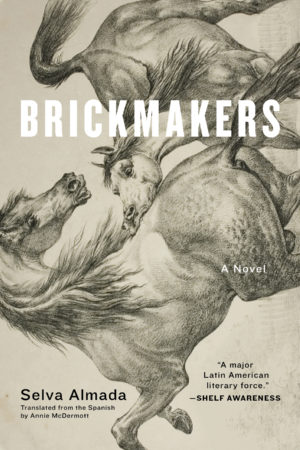Brickmakers
by Selva Almada, translated by Annie McDermott
reviewed by Steven Flores
Selva Almada’s star has been rising in her native Argentina for nearly a decade. Only recently, however, has her work found an expanded Anglophone audience through translation, thanks to Charco Press’s publication of The Wind That Lays Waste (2019) and Dead Girls (2020). Brickmakers—her latest novel to be translated to English, published by Graywolf Press—is a gritty examination of machismo, violence, and sexual identity set in a provincial Argentinian town.
The novel begins with two young men, Pajarito Tamai and Marciano Miranda, bleeding out on an abandoned fairground. Over a series of short, delineated chapters, Almada explores the machismo that led these two teenagers to their violent end. The braided narrative alternates between Pajarito and Marciano’s stories with an agile third-person voice, using the liminal state between life and death as both memory palace and bardo. The characters’ consciousnesses roam through their pasts and through the times before they were born, examining the lives of the boys’ fathers, from whom they’ve inherited a particular brand of violent masculinity.
The setting also reflects this concern. The boys’ provincial “indio” village exerts such a gravitational pull that escape seems impossible. Hot, dry and desolate, it is easy to read the village as a kiln. The fathers are also literal brickmakers, but their conflict arises more from alchemy than direct competition. Consumed by vice, Pájaro and Elvio’s drinking, gambling, and bullying bring them toward an inevitable confrontation. After a late night of drinking and partying, “one of them made some comment and the other took it wrong, then they were on their feet, chairs skidding back.” That night, friends bring them to their senses, but the stalled violence simmers. Soon the fathers are embroiled in an all-out feud that they pass on to their sons, Pajarito and Marciano. What begins as a series of vendettas transforms into a Montague-and-Capulet-style feud when Marciano’s younger brother, Ángel, falls in love with Pajarito.
Throughout the novel, machismo moves relations from a state of nature into animus. Pajarito and Marciano are friends out in the neighborhood, but when their fathers find out, they become enemies by fiat. The community does little to intervene, taking a “boys will be boys” approach while not seeming to notice that the “boys” in question are often adult men. For instance, young Pajarito has a penchant for running off, and his father punishes him by herding him through town like a gaucho.
Of course, at home [Pájaro] could flog Pajarito to his heart’s content; but making him trot along like that, bringing the whip whistling down on his head, in full view of everyone, the kid publicly humiliated and him firmly reinstated as head of the family in the neighbors’ eyes, delighted one and mortified another in equal measure.
As the novel progresses, the reader pieces together clues that Pájaro Tamai is likely bisexual and is using violence against his son because he and Pajarito are “too alike.” After Pajarito himself has his first gay encounter, he reacts with the urge to beat his lover and “undress [a] girl, whoever she is, throw her down on the bed, and fuck her brains out.” Throughout the novel, homophobia and misogyny are the reaction formations forged by machismo—the unyielding bricks foreclosing the possible shapes of the human spirit.
Readers familiar with Almada’s oeuvre will find her newest novel a midway point between the stark allegorical men of The Wind That Lays Waste and the resilient, vividly portrayed women of Dead Girls. Almada plays fast and loose with sociological tropes, so those looking for extended psychological character studies may be disappointed. Readers may also grapple with the delineated structure, which sometimes interferes with the elegance of the storytelling. Finally, while the women in Brickmakers are a pleasure to behold in their stoic complexity, the men read a bit reductively, each a collection of vices without account.
Though perhaps that is the point: masculinity means conforming to the rigid demands of machismo. In this, the novel finds a wonderful companion text in Fernanda Melchor’s harrowingly brilliant Hurricane Season. Almada’s novel shares Melchor’s concern for how homophobia intersects with broader cultural forces of poverty, patriarchy, misogyny, religion, and—especially—violence. Like Melchor’s novel, the physical and emotional violence of Brickmakers is hard to witness, but not needlessly so. In the United States—a country where 0.7 percent of the literary fiction published is work in translation—we are lucky that translator Annie McDermott has brought Almada’s unflinching portrait of provincial Argentina to our bookshelves.
Published on May 3, 2022

